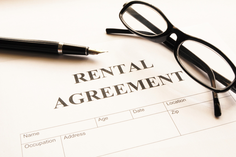 By Elspeth Crawford In a perfect world, landlords and tenants can work together without issue, both generously doing their part to keep each other happy and not disturbing their neighbors. In fact, lots of tenant-landlord relationships fit this description, but we've all heard horror stories about the exceptions. And laws that protect both parties have become so complex that understanding your rights can be like herding cats. Since landlord-tenant law varies by state, the key is knowing your rights -- preferably before you even sign your rental agreement. Understanding your state law and the terms of your lease are your best guarantees against future problems. Common Renters' Rights Although renters' rights vary by region, many are pretty predictable. Here's a sample of rights likely to be addressed in your state's landlord-tenant law:
Protect Yourself Before you move in, tour the premises with your landlord, and note -- or better yet, photograph -- any existing damage. When you move out, if your landlord withholds part of your damage deposit, ask for an itemized list of charges and the reason for the charges. If there's a discrepancy between this list and the one you made before moving in, let the landlord know immediately. Keep copies of all correspondence with your landlord, as well as dated records of phone and in-person conversations. If you have a dispute If your landlord takes an action that is illegal in your state or neglects a legality, you probably have grounds for legal action, but consider court as a last resort. First make every effort to resolve the problem by talking with your landlord. This is the simplest and least expensive approach to mediating disputes. If the problem continues, enlist the help of a neutral party or a mediator. Mediators are usually publicly funded and available free or at low cost. To find out whether mediators are available in your area, contact your mayor's or city manager's office and ask to talk with someone about housing disputes or landlord-tenant mediation. If all else fails, you can take financial complaints to small claims court, provided your claim is under a specified amount. Before you take this step, be sure to look up local law regarding your responsibility for attorney fees. Most larger cities offer free or low-cost legal support for tenants in case of a property dispute. You can also contact your state bar association to ask about its lawyer referral program, or check with local service agencies to find out about inexpensive legal clinics.
2 Comments
Mato Ray
4/4/2022 07:48:21 pm
I'm just too happy that everything is in place for me now. I would gladly recommend the use of spell to any one going through marriage problems and want to put an end to it by emailing Dr Emu through [email protected] and that was where I got the help to restore my marriage. WhatsApp +2347012841542
Reply
Paul Cullen
5/17/2024 04:44:47 am
Thank you LORD KRISH for manifesting my work within 24 hours as you promised. I have come online to say that I am happy to have met Lord Krish who help me in getting back my ex wife who left me for a wealthy man because she wants to have expensive things. I met Lord Krish and he helped me with a love spell and she returned to me within 24 hours of contacting Lord Krish. After 5 months of struggling with emotional heart break, I am finally happy to have my love back in my life. I never believed love spells are very true until I met Lord Krish and it was also through same testimonies. I promised Lord Krish I would share his name on the internet to bring people to him. Contact Lord Krish to see his manifestation in your marriage at his EMAIL: [email protected]
Reply
Leave a Reply. |
Archives
January 2022
|
Lake Norman Location
9620 Sherrill Estates Road
Huntersville, North Carolina 28078
(704) 274-5677 main
(704) 231-5762 text
(877) 208-7577 fax
9620 Sherrill Estates Road
Huntersville, North Carolina 28078
(704) 274-5677 main
(704) 231-5762 text
(877) 208-7577 fax
